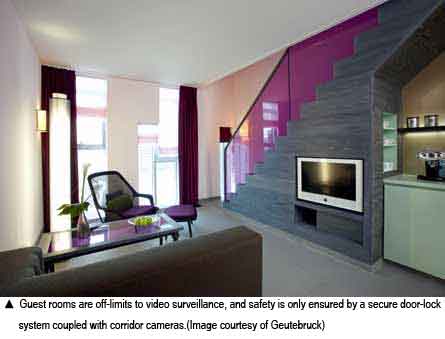Management Mentality
Hotel management is largely bound by group strategies , budgetary constraints and local regulations. “The hotel market is very global in nature and driven by big multinationals and their demand,” Venas observed. “Therefore, there are no significant differences across regions, but rather across international hotel chains and small independent hotels as well as their star ratings, regardless of their location.”
Local regulations often clearly outline how much or little video coverage hotels should have. “In regions such as the Gulf, regulations make it compulsory to have extensive surveillance coverage,” said Francois Carle, VP of Hotel Solutions, Schneider Electric. “In other countries like Italy, the protection of personal privacy limits the use of cameras in public spaces.” Due to knowledge gaps i n technology availability and value propositions, many perceive security equipment, especially network video, to be more of a cost factor rather than a long-term ROI, Jasmani said. “Our focus is on facilitating the understanding and acceptance of different technologies.”
“In the hospitality industry, the building owner is very often not the operator. As such, interests vary significantly in terms of what security systems should be implemented,” Hartmann said. “Hotel operators' primary concern is protecting the hotel brand and reputation, as well as limiting potential risks or damage to the building in order to maintain business continuity. The building owner will focus on making sure the building meets local standards and building regulations, but not more. As a result, the biggest difference will arise not from variations in mentality or requirements (codes and standards), but rather through who owns the hotel building — the hotel operator or a third party.”
Thanks to volatile political situations, emerging markets tend to emphasize more on security requirements, Hartmann said. “However, there is also rising security awareness in more established markets, in part due to new global security threats, but also due to the type of travelers. For instance, women now account for up to 50 percent of business travelers in certain regions.”
Privacy Versus Safety
 Striking aperfect balance between privacy and safety is an ongoing challenge for hoteliers — too many security gadgets might make guests feel conscious about their every move, while too little security coverage opens up security loopholes and do not offer guests peace of mind.
Striking aperfect balance between privacy and safety is an ongoing challenge for hoteliers — too many security gadgets might make guests feel conscious about their every move, while too little security coverage opens up security loopholes and do not offer guests peace of mind.
The issue is twofold, Hartmann explained. “First, it is about the transparency of guest identity, behavior, location and such that modern systems provide. Addressing this concern depends on the perception of what constitutes data necessity for the purposes of security, and this, in turn, depends on where you are in the world.” For instance, such concerns are greater in Europe than in certain emerging markets where people are more risk-aware. There is also a generation aspect to consider. “Younger guests more accustomed to engaging in social media are likely to have lower privacy expectations, and, therefore, be more open to what could be deemed by others as intrusive.”
Second, hotels need to protect the increasing amount of data they now hold on their guests, Hartmann said. “Most global hotel chains tend to have privacy policies that provide some degree of protection, but the hospitality industry still has some way to go to reach data protection levels considered acceptable in many other spheres of business activity.”
With video surveillance, the majority of guests understand and appreciate the security measures and enhancement needed at hotels, Lim said. “As long as the cameras are placed appropriately in elevators, lobbies and corridors, guests tend to want to feel safer and not less safe.”
“I can't recall a time when guests complained about heavy surveillance,” Fancourt added. “Guests understand this is for their best interest. When an incident occurs in a hotel that concerns our guests, the more information that can be used to investigate, the better — it is for the aftermath. With newer technology available, a swifter process to collect forensic evidence is now common.”
Many mid- to high-end hotels place great emphasis on interior design, and so camera exterior design becomes a deciding factor in the procurement process. “Especially in places like Europe, hotel customers favor aesthetic camera designs that fit into the elegant surroundings and offer unobtrusive yet reliable surveillance,” Ku added.
For access control of guest rooms, most hotels are moving away from simple card systems, such as magnetic or low-encryption cards, Lim said. “The more reputable hotels have concerns about the confidence level guests would have if their room cards are easily duplicable by staff or visitors.” To address such concerns, contactless cards and up-to-date RFID technologies are increasingly used for added access security and privacy. Restricted room access is beneficial in maintaining both guest privacy/security and hotel property.
Restricting and/or managing staff access to guest rooms and different areas is becoming a focal point as well. “Some access cards can be master cards, which the hotel has no audit trail over,” Lim said. However, more hotels are targeting this possible security and privacy breach. “Some hotels insist on having individually encrypted cards for their staff, so an audit trail of the time and date a housekeeping attendant entered a particular guest room can be made available.” A clear record allows hotel management to monitor and proceed with daily operations without intruding on guest privacy and provides timely response should an incident or discrepancy occur.
The second part of this feature explores the increasingly popular management shift to operating a hotel based on building automation and energy-saving principles. Security implementations that complement these requirements can help save money and boost brand/corporate responsibility image.